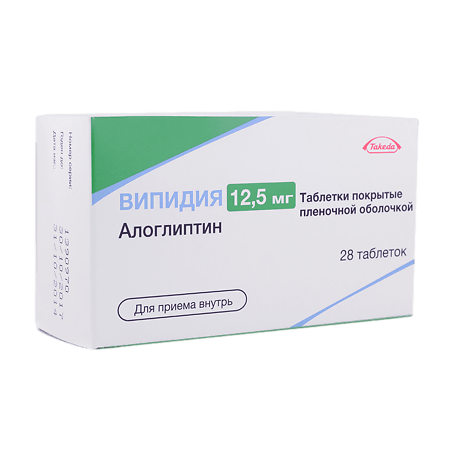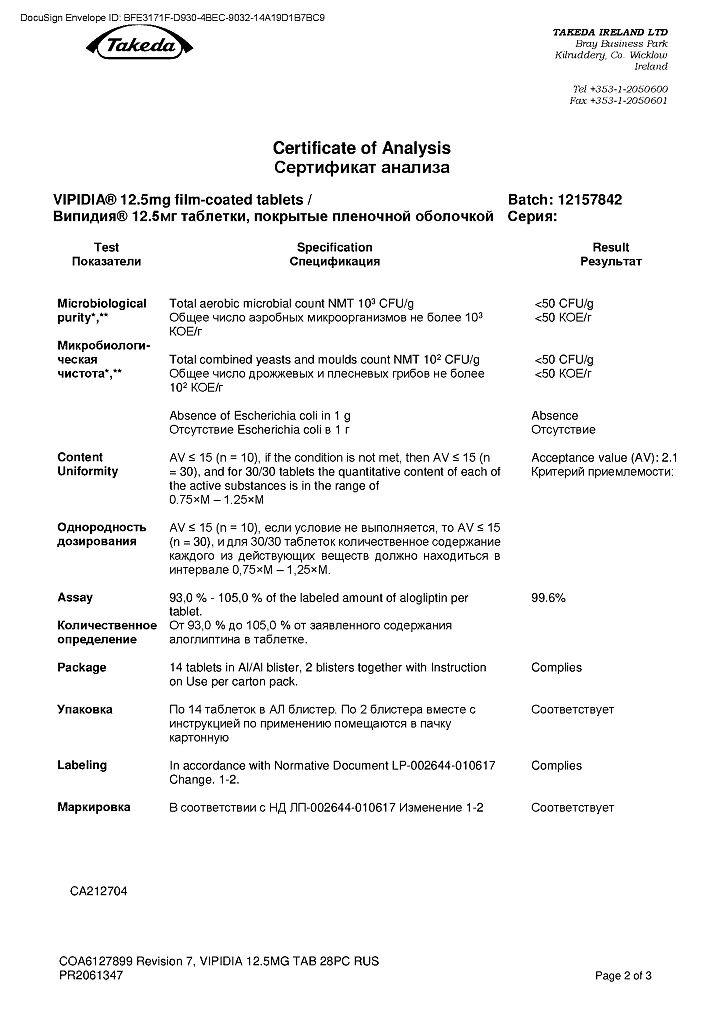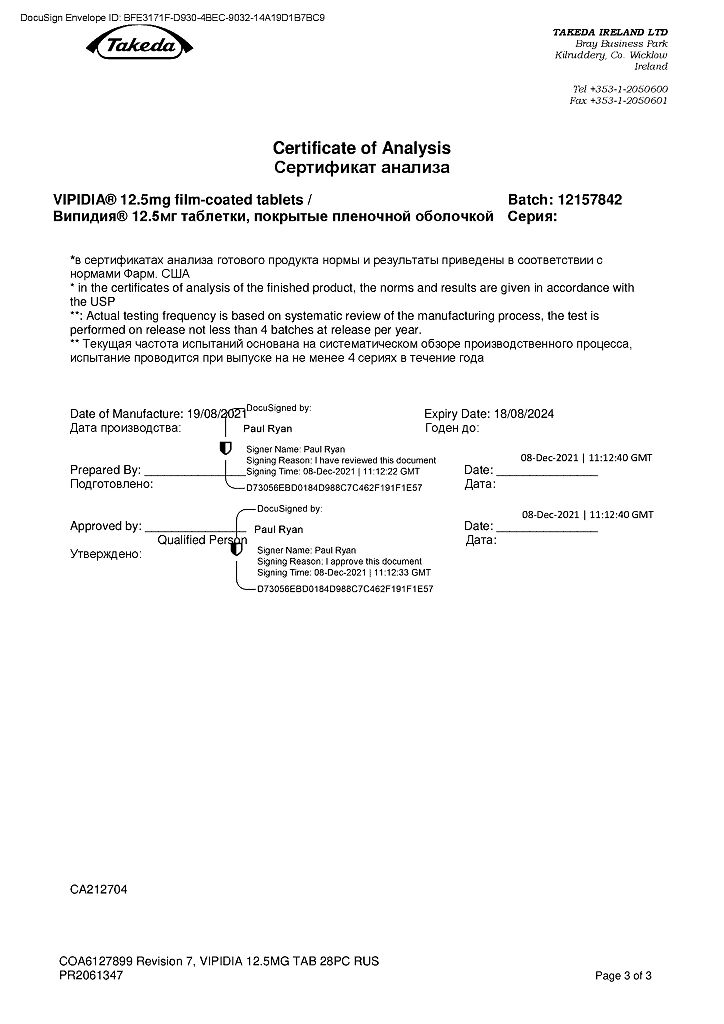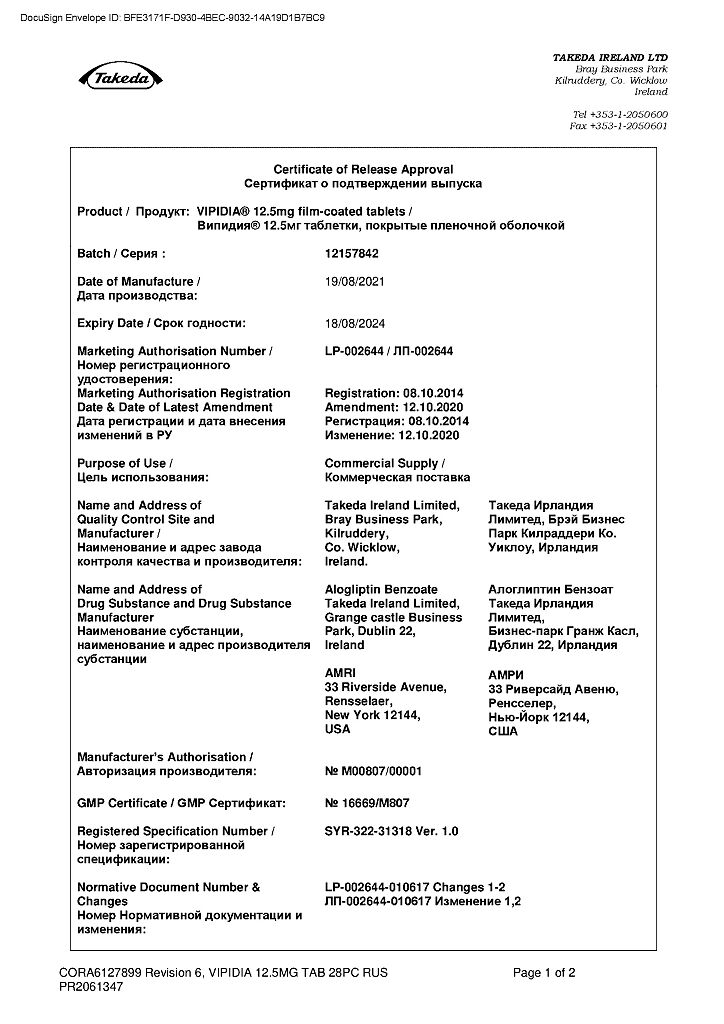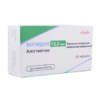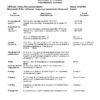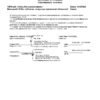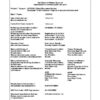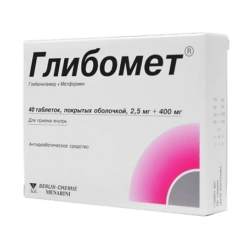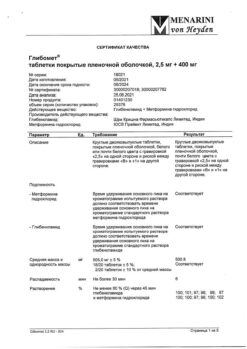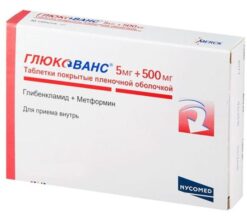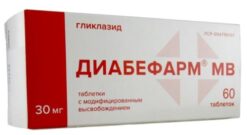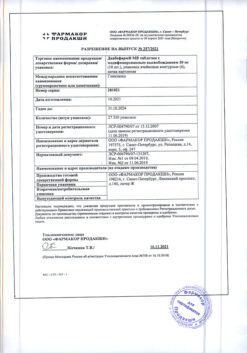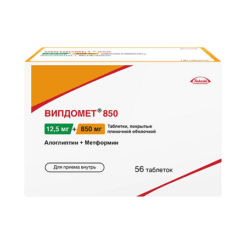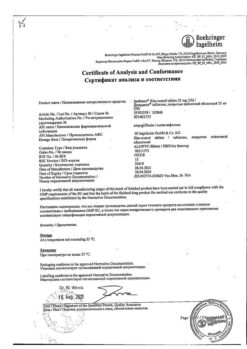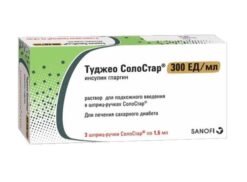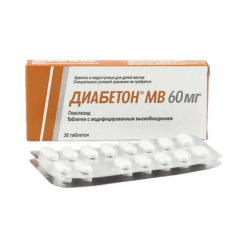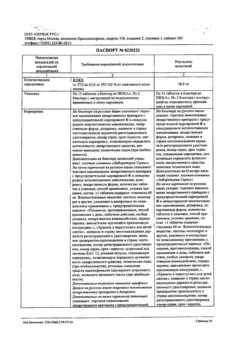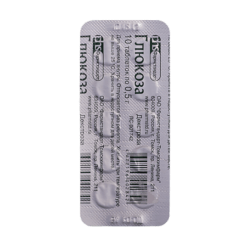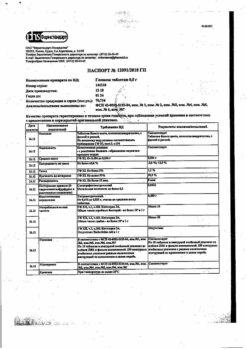No products in the cart.
Vipidia, 12.5mg 28 pcs.
€30.15 €25.13
Description
Alogliptin is a potent and highly selective DPP-4 inhibitor. Its selectivity against DPP-4 is more than 10,000 times greater than its activity against other related enzymes, including DPP-8 and DPP-9. DFS-4 is the major enzyme involved in the rapid degradation of the hormones of the insectin family: glucagon-like peptide-1 (GFP-1) and glucose-dependent insulinotropic polypeptide (GIP).
The hormones of the incretin family are secreted in the intestine and their concentration increases in response to food intake. GFP-1 and GIP increase insulin synthesis and secretion by pancreatic beta cells. GFP-1 also inhibits glucagon secretion and decreases glucose production by the liver.
Therefore, by increasing the concentration of incretins, alogliptin increases glucose-dependent insulin secretion and decreases glucagon secretion at elevated blood glucose concentrations.
In patients with type 2 diabetes mellitus with hyperglycemia, these changes in insulin and glucagon secretion lead to a decrease in glycosylated hemoglobin HbA1c and decreased plasma glucose concentrations on both fasting and postprandial glucose.
Indications
Indications
Type 2 diabetes mellitus to improve glycemic control when diet therapy and exercise are ineffective:
in adults as monotherapy, in combination with other oral hypoglycemic agents or with insulin.
Pharmacological effect
Pharmacological effect
Alogliptin is a potent and highly selective DPP-4 inhibitor. Its selectivity for DPP-4 is more than 10,000 times greater than its selectivity for other related enzymes, including DPP-8 and DPP-9. DPP-4 is the main enzyme involved in the rapid destruction of the incretin family hormones: glucagon-like peptide-1 (GLP-1) and glucose-dependent insulinotropic polypeptide (GIP).
Hormones of the incretin family are secreted in the intestine, their concentration increases in response to food intake. GLP-1 and GIP increase insulin synthesis and secretion by pancreatic beta cells. GLP-1 also inhibits glucagon secretion and reduces hepatic glucose production.
Therefore, by increasing the concentration of incretins, alogliptin increases glucose-dependent insulin secretion and reduces glucagon secretion at elevated blood glucose concentrations.
In patients with type 2 diabetes mellitus with hyperglycemia, these changes in insulin and glucagon secretion lead to a decrease in the concentration of glycosylated hemoglobin HbA1c and a decrease in plasma glucose concentrations in both fasting and postprandial glucose.
Special instructions
Special instructions
Use with other hypoglycemic drugs
In order to reduce the risk of hypoglycemia, it is recommended to reduce the dose of sulfonylurea derivatives, insulin or the combination of pioglitazone (thiazolidinedione) with metformin when used simultaneously with Vipidia®.
Unexplored combinations
The effectiveness and safety of Vipidia® in combination with inhibitors of sodium-dependent glucose cotransporter 2 or glucagon-like peptide analogues and in triple combination with metformin and sulfonylurea derivatives have not been studied.
Kidney failure
Because patients with moderate renal failure require dose adjustment of Vipidia®; it is recommended to assess renal function before starting and periodically during treatment.
Experience with the use of alogliptin in patients on hemodialysis is limited. Vipidia® should not be used in patients with severe renal failure, as well as in patients with end-stage chronic renal failure requiring hemodialysis. Alogliptin has not been studied in patients undergoing peritoneal dialysis.
Acute pancreatitis
The use of DPP-4 inhibitors is associated with a potential risk of developing acute pancreatitis. In a pooled analysis of 13 clinical studies of alogliptin 25 mg/day, 12.5 mg/day, comparator, and placebo, the incidence of acute pancreatitis was 2, 1, 1, or 0 cases per 1000 patient-years in each group, respectively. In the Cardiovascular Outcomes Study, the incidence of acute pancreatitis in patients treated with alogliptin or placebo was 3 and 2 cases per 1000 patient-years, respectively. Patients should be informed of the characteristic symptoms of acute pancreatitis: persistent severe abdominal pain that may radiate to the back. If the development of acute pancreatitis is suspected, stop taking Vipidia®; If acute pancreatitis is confirmed, the drug should not be resumed. There is no data on whether there is an increased risk of developing pancreatitis while taking Vipidia® in patients with a history of pancreatitis. Therefore, caution should be used when using the drug in patients with a history of pancreatitis.
Liver failure
There have been post-marketing reports of liver dysfunction, including liver failure, with alogliptin. Their connection with the use of the drug has not been established. However, patients should be carefully examined for possible abnormalities in liver function. If abnormalities in liver function are detected and an alternative etiology for their occurrence has not been established, the possibility of discontinuing treatment with the drug should be considered.
Impact on the ability to drive vehicles and machinery
Vipidia® has no or negligible effect on the ability to drive vehicles and machines. However, the risk of hypoglycemia should be taken into account when using the drug in combination with other hypoglycemic drugs (sulfonylurea derivatives, insulin or combination therapy with pioglitazone and metformin) and use caution when driving vehicles and machinery.
Active ingredient
Active ingredient
Alogliptin
Composition
Composition
1 tablet 12.5 mg contains
Contraindications
Contraindications
hypersensitivity to alogliptin or to any excipient, or a history of serious hypersensitivity reactions to any DPP-4 inhibitor, including anaphylactic reactions, anaphylactic shock and angioedema;
type 1 diabetes mellitus;
diabetic ketoacidosis;
chronic heart failure (functional class III-IV according to the functional classification of chronic heart failure of the New York Heart Association);
severe liver failure (more than 9 points on the Child-Pugh scale) due to the lack of clinical data on use;
severe renal failure;
pregnancy, breastfeeding – due to the lack of clinical data on use;
children under 18 years of age – due to the lack of clinical data on use.
With caution
History of acute pancreatitis (see Special Instructions).
In patients with moderate renal failure (see Special Instructions).
In combination with a sulfonylurea derivative or insulin (see Special instructions).
Taking a three-component combination of the drug Vipidia with metformin and thiazolidinedione (see Special instructions).
Side Effects
Side Effects
Nervous system disorders:
Interaction
Interaction
Effect of other drugs on alogliptin
Overdose
Overdose
The maximum dose of alogliptin in clinical studies was 800 mg/day in healthy volunteers and 400 mg/day in patients with type 2 diabetes mellitus for 14 days.
Storage conditions
Storage conditions
Store at a temperature not exceeding 25°C.
Shelf life
Shelf life
3 years.
Manufacturer
Manufacturer
Takeda Island Limited, Ireland
Additional information
| Shelf life | 3 years. |
|---|---|
| Conditions of storage | Store at a temperature not exceeding 25 ° C. |
| Manufacturer | Takeda Island Limited, Ireland |
| Medication form | pills |
| Brand | Takeda Island Limited |
Related products
Buy Vipidia, 12.5mg 28 pcs. with delivery to USA, UK, Europe and over 120 other countries.

